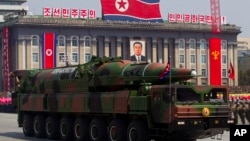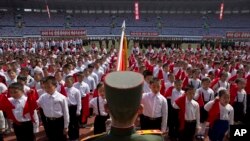SEOUL —
There are further indications North Korea may be preparing to conduct nuclear and missile tests - actions that would again violate international sanctions against it.
Amid official concerns in Seoul and Washington that North Korea could be poised to launch one or more of its untested medium-range missiles, South Korea's government is also acknowledging Pyongyang may attempt a fourth nuclear test.
On Monday, lawmakers at a South Korean National Assembly committee meeting asked the Unification Minister, Ryoo Kihl-jae, about nuclear activity.
Ryoo says there “is such a sign” of preparation activity at the Punggye-ri site but he will not comment further on matters related to intelligence.
At that location, North Korea in February conducted its third nuclear test in seven years.
UN violations
Its nuclear tests, as well any medium or long range ballistic missile launches, violate U.N. sanctions.
North Korea has recently hinted that it has the capability to produce both plutonium and uranium fueled weapons and that it has developed a warhead small enough to fit atop a missile. But most experts doubt it has yet achieved that capability.
Kim Min-seok is a spokesman for South Korea's Ministry of National Defense. He says Kim says the South is responding calmly and closely monitoring the North's activity through various systems and is preparing for possible provocations.
Tokyo could shoot down missile
Japan's defense minister has authorized the country's self defense forces to shoot down any incoming North Korea missile. This is the first time such authorization has been given prior to any announcement from Pyongyang of a planned missile test.
The Defense Ministry in Tokyo also confirms the United States is considering deploying high altitude aerial reconnaissance “Global Hawk” drones to Misawa air base in northern Japan to monitor North Korea.
Officials in Pyongyang last week advised the 24 diplomatic missions there they should consider evacuating their embassies, saying safety could not be guaranteed after April 10th.
US alters plans
Meanwhile, the commander of U.S. forces in South Korea, General James Thurman, has canceled a scheduled trip to Washington. He was testify before several Congressional committees this week but the military says based on developments it is prudent for the general to remain on the peninsula.
The U.S. Defense Department has delayed a test launch from California of a Minuteman 3 intercontinental ballistic missile. Officials say while the test had no connection to North Korea, it was felt best to postpone it so as to not further exacerbate tension.
North Korea increased its bellicose rhetoric after the U.S. Air Force sent long-range strategic bombers to fly over South Korea during a current joint annual exercise.
Dispute affects workers in border complex
There is also continuing focus on the status of the only joint project between the two Koreas, the industrial complex at Kaesong, just north of the border.
North Korea's news agency says the secretary of the Central Committee of the Workers' Party, Kim Yang Gon, on Monday visited the zone to “size up the situation.”
North Korea since last week has refused to issue permits for South Korean managers and cargo trucks to enter.
At least 13 the 123 small factories making households goods at Kaesong have ceased operations. About 500 South Korean managers still remain on site but are continuing to trickle back home and dozens more firms are likely to halt production this week due to dwindling supplies.
South Korean government officials and analysts are expressing concern that should operations be fully suspended, it would significantly escalate already high tension on the peninsula.
The complex employs thousands of North Koreans. Their salaries go to their cash-strapped government and are a significant source of hard currency for it.
Pyongyang steps up rhetoric
North Korea has recently taken its threatening rhetoric to an unprecedented level.
After a missile launch and nuclear test in violation of U.N. sanctions Pyongyang has announced an abrogation of the 1953 armistice, threatened the United States and its Pacific bases with preemptive nuclear strikes and declared that a state of war exists between the North and the South.
Top officials of South Korea's government, including the president, have repeatedly warned North Korea through public statements it faces a punishing military response should the South feel that its citizens are endangered.
U.S. military officers in South Korea, speaking to VOA News (on condition they not be identified) in recent days, have expressed concern about an over-reaction or accidental firing by South Korean forces now on high alert.
Agreements between the U.S. and South Korean militaries call for close consultations on any response. General Thurman, as head of the Combined Forces Command, would also lead South Korean forces if full-scale war erupts.
The chairman of the U.S. Joint Chiefs of Staff, General Martin Dempsey, on Sunday said he does not believe North Korea is poised to engage in military action but he “can't take the chance that it won't.”
Amid official concerns in Seoul and Washington that North Korea could be poised to launch one or more of its untested medium-range missiles, South Korea's government is also acknowledging Pyongyang may attempt a fourth nuclear test.
On Monday, lawmakers at a South Korean National Assembly committee meeting asked the Unification Minister, Ryoo Kihl-jae, about nuclear activity.
Ryoo says there “is such a sign” of preparation activity at the Punggye-ri site but he will not comment further on matters related to intelligence.
At that location, North Korea in February conducted its third nuclear test in seven years.
UN violations
Its nuclear tests, as well any medium or long range ballistic missile launches, violate U.N. sanctions.
North Korea has recently hinted that it has the capability to produce both plutonium and uranium fueled weapons and that it has developed a warhead small enough to fit atop a missile. But most experts doubt it has yet achieved that capability.
Kim Min-seok is a spokesman for South Korea's Ministry of National Defense. He says Kim says the South is responding calmly and closely monitoring the North's activity through various systems and is preparing for possible provocations.
Tokyo could shoot down missile
Japan's defense minister has authorized the country's self defense forces to shoot down any incoming North Korea missile. This is the first time such authorization has been given prior to any announcement from Pyongyang of a planned missile test.
The Defense Ministry in Tokyo also confirms the United States is considering deploying high altitude aerial reconnaissance “Global Hawk” drones to Misawa air base in northern Japan to monitor North Korea.
Officials in Pyongyang last week advised the 24 diplomatic missions there they should consider evacuating their embassies, saying safety could not be guaranteed after April 10th.
US alters plans
Meanwhile, the commander of U.S. forces in South Korea, General James Thurman, has canceled a scheduled trip to Washington. He was testify before several Congressional committees this week but the military says based on developments it is prudent for the general to remain on the peninsula.
The U.S. Defense Department has delayed a test launch from California of a Minuteman 3 intercontinental ballistic missile. Officials say while the test had no connection to North Korea, it was felt best to postpone it so as to not further exacerbate tension.
North Korea increased its bellicose rhetoric after the U.S. Air Force sent long-range strategic bombers to fly over South Korea during a current joint annual exercise.
Dispute affects workers in border complex
There is also continuing focus on the status of the only joint project between the two Koreas, the industrial complex at Kaesong, just north of the border.
North Korea's news agency says the secretary of the Central Committee of the Workers' Party, Kim Yang Gon, on Monday visited the zone to “size up the situation.”
North Korea since last week has refused to issue permits for South Korean managers and cargo trucks to enter.
At least 13 the 123 small factories making households goods at Kaesong have ceased operations. About 500 South Korean managers still remain on site but are continuing to trickle back home and dozens more firms are likely to halt production this week due to dwindling supplies.
South Korean government officials and analysts are expressing concern that should operations be fully suspended, it would significantly escalate already high tension on the peninsula.
The complex employs thousands of North Koreans. Their salaries go to their cash-strapped government and are a significant source of hard currency for it.
Pyongyang steps up rhetoric
North Korea has recently taken its threatening rhetoric to an unprecedented level.
After a missile launch and nuclear test in violation of U.N. sanctions Pyongyang has announced an abrogation of the 1953 armistice, threatened the United States and its Pacific bases with preemptive nuclear strikes and declared that a state of war exists between the North and the South.
Top officials of South Korea's government, including the president, have repeatedly warned North Korea through public statements it faces a punishing military response should the South feel that its citizens are endangered.
U.S. military officers in South Korea, speaking to VOA News (on condition they not be identified) in recent days, have expressed concern about an over-reaction or accidental firing by South Korean forces now on high alert.
Agreements between the U.S. and South Korean militaries call for close consultations on any response. General Thurman, as head of the Combined Forces Command, would also lead South Korean forces if full-scale war erupts.
The chairman of the U.S. Joint Chiefs of Staff, General Martin Dempsey, on Sunday said he does not believe North Korea is poised to engage in military action but he “can't take the chance that it won't.”






